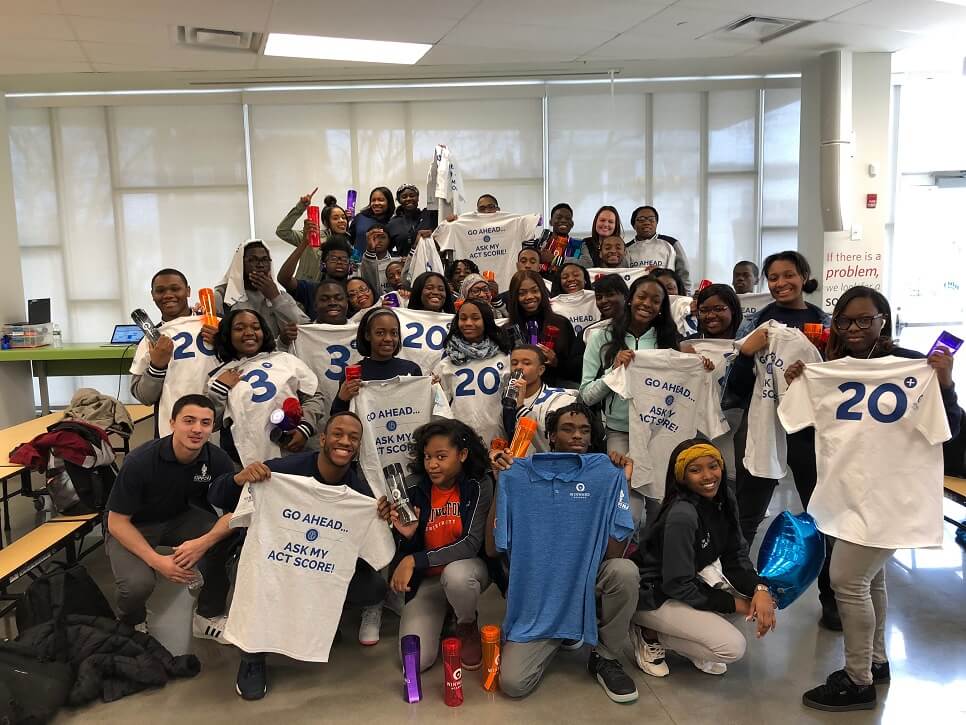THE INTERVIEW: JAIME CASAP, EDUCATIONAL EVANGELIST AT GOOGLE
REIMAGINE NEWSLETTER: ISSUE 29
It was midnight when Shaheed finished his shift at Burger King, a job he took to support his family’s living expenses. He’d been there since 4pm, right after drum line practice ended. As he waited for the bus to take him home, he thought about the day ahead of him, a big day, one for which he and his classmates attending KIPP Newark Collegiate Academy (NCA) had been preparing diligently for the prior month and a half.
It was ACT test day, and the stakes were high. Shaheed’s scores would potentially influence not only his college acceptances but also the extent of financial aid that might be available to him. That he’d only had six weeks to prepare already put him at a disadvantage. Many of his same-age peers attending some of the east coast’s most elite boarding schools less than an hour away would’ve spent months – if not years – preparing, paying upwards of $20,000-$30,000 just to hit the coveted ACT score of 30 or higher. For Shaheed and his peers, paying for test preparation was beyond their means, but, thanks to a partnership between NCA and Winward Academy, Shaheed and his classmates were able to participate in a learner-centered educational program informed by more than forty years of learning research.

Shaheed and his peers attend an inner city high school in Newark, New Jersey. They are the students many doubt will overcome their economic circumstances. They’re the ones implicitly alluded to in statements like those of Dr. Sean F. Reardon – a professor at the Stanford Graduate School of Education and one of the nation’s leading experts on education segregation – when he says, “we don’t have much evidence of places that have been systematically successful when they serve very large populations of low-income students.”
Yet, that Saturday morning after just three hours of sleep and only six weeks of preparation, Shaheed earned that coveted 30, placing him in the top 5% of test takers. The school’s resulting celebration didn’t just acknowledge Shaheed, however. His fellow classmates showed an unprecedented average improvement of 33 percentile points over the prior year’s scores. Shaheed and his classmates provided evidence that students from low-income backgrounds can be systematically successful.
Ryan Hill, CEO of KIPP: New Jersey, predicted in 2007 that “Newark would be the first major American city to prove all kids could achieve.” Now, NCA has done exactly that, and it’s time for other schools and major cities across the country to rise to the challenge.
The success of Shaheed and his peers attending NCA demonstrates what happens when the same educational resources typically reserved for students attending high-resource schools are made available to students attending an inner-city school. In this case, a partnership between NCA and Winward Academy was formed to provide such resources when a member of the KIPP: New Jersey Board, whose son improved 9 points on the ACT using Winward Academy, approached its founder, Dr. Jennifer Winward, about providing her platform to NCA. Dr. Winward welcomed the opportunity to support students at NCA given Winward Academy’s core mission to provide quality teaching to all students and philanthropic commitment to support underrepresented youth.
Per the ACT Condition of College and Career Readiness annual report, students attending NCA are considered “underserved,” which the report defines as meeting at least one of three criteria outlined as “minority, low-income, and/or [a] first-generation college student.” A national report by ACT found that “of those who match all three criteria, only 9 percent show a ‘strong-readiness’ for college-level work.” KIPP NCA students, who meet all three criteria, started above the national average of 9%, with 16% of students meeting the ACT benchmark for college readiness, yet NCA school leaders – believing wholeheartedly in the potential of their students – were steadfast in their commitment to do more. The window for score improvement was limited. The academic year had already begun, and the graduating seniors’ last chance to take the ACT before college applications were due was just six weeks away. Dr. Winward and the NCA team got to work immediately.
School staff converted the football storage closet into a space for students to access the Winward Academy platform each day. Due to the limited time window, Dr. Winward analyzed past ACT exams and handpicked ten high-impact lessons based on the most frequently tested concepts over the past twenty years. One teacher was assigned to lead a daily senior seminar incorporating Winward Academy lessons and practice questions into the curriculum. In class, Shaheed and his peers completed lessons that gradually increased in level of difficulty and allowed them to adjust instructional pace to fit their desired learning speed. They completed practice questions and immediately reviewed step-by-step explanations that not only discussed why the correct answer was right but also broke down all incorrect answer choices. The emphasis on building future knowledge by learning from mistakes shifted students’ mindset to one that embraced mistakes as an opportunity to learn.
The strategy paid off, brilliantly. 53% of KIPP NCA students met at least one of the ACT benchmark criteria for readiness for college level work. Students were 3.5x more likely to be college ready in English, 4.0x more likely in Math, 3.6x more likely in Reading, and 4.0x more likely in Science. One student improved his ACT English score by 10 points, from the 52nd to the 91st percentile, after having moved to the U.S. speaking Igbo only three years earlier. The student reflected that the experience of seeing the time he invested in studying reflected in the score he earned “inspired [his] confidence and [his] commitment to excellence, giving [him] hope about making it out of Newark and being successful.”

Shaheed’s and his classmates’ success was always possible, despite prevalent problematic narratives about high achievement in urban schools as exceptions rather than as expectations. Nevertheless, prior attempts using five other ACT test preparation programs had failed NCA students. The difference this time: using a research-informed, student-centered learning platform with an approach to ACT prep that cares about more than ACT test scores.
According to Dr. Winward, founder and lead instructor of Winward Academy, the focus of test preparation shouldn’t be on beating one 4-hour test; it should be on equipping students with skills for life-long learning and success. “The ACT and SAT test foundations in grammar and writing, problem-solving skills in mathematics, and the ability to read carefully, identify key information in figures and tables, and present a cogent argument. These skills are not just important for one exam; they actually matter for life. Let’s empower youth with skills and content knowledge, so they not only show up for the ACT or SAT answering questions automatically, but also embrace their future academic, professional, and personal lives with confidence.”
While it’s easy to give in to the urge of defining success in terms of score growth, success goes beyond numbers and scores. It’s about young people with boundless potential whose college opportunities have potentially been expanded. According to Dr. Monica Esqueda — herself a first-generation college student, educator, and now an Education Specialist at the University of California, Davis Center for Educational Effectiveness — “research has consistently shown that resource inequities have long contributed to opportunity gaps, and that when resources are equitably provided, quantitative measures of student success improve. This isn’t new information. Nevertheless, what is often left out of mainstream discussions, specifically conversations had outside of education circles, is the importance of passionate and caring educators and educational programming that not only recognizes the potential of all students, regardless of their backgrounds, but also sees what deficit-minded individuals view as barriers to success as assets that can be leveraged to empower students.”
NCA students are young people who work hard and care about their families and futures. Collectively, they have shown naysayers that despite long-held and problematic stereotypes, low-income urban youth — when afforded the same opportunities as their peers from higher earning families — will walk in their excellence.

